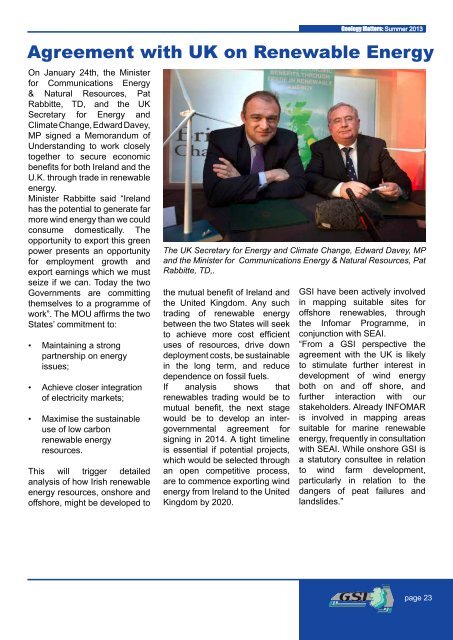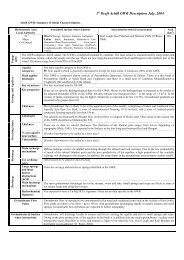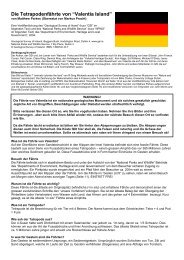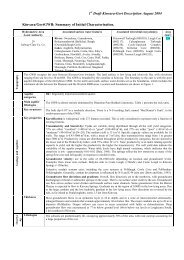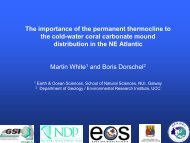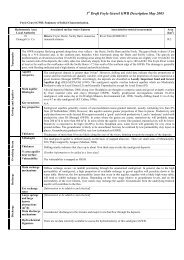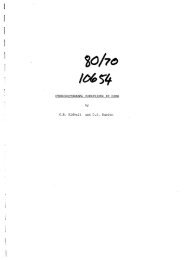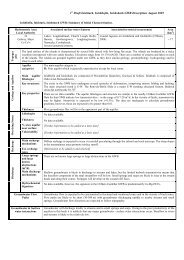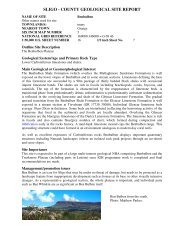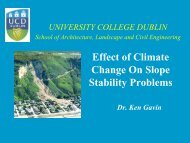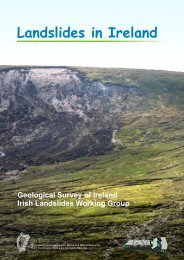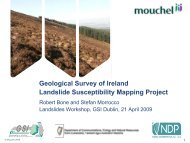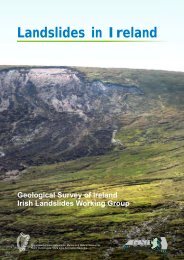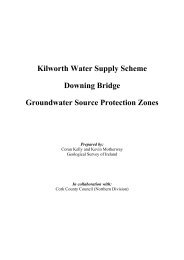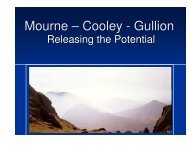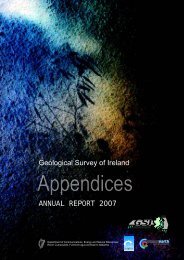Sinkholes Tellus Border Earthquake - Geological Survey of Ireland
Sinkholes Tellus Border Earthquake - Geological Survey of Ireland
Sinkholes Tellus Border Earthquake - Geological Survey of Ireland
Create successful ePaper yourself
Turn your PDF publications into a flip-book with our unique Google optimized e-Paper software.
Geology Matters: Summer 2013<br />
Agreement with UK on Renewable Energy<br />
On January 24th, the Minister<br />
for Communications Energy<br />
& Natural Resources, Pat<br />
Rabbitte, TD, and the UK<br />
Secretary for Energy and<br />
Climate Change, Edward Davey,<br />
MP signed a Memorandum <strong>of</strong><br />
Understanding to work closely<br />
together to secure economic<br />
benefits for both <strong>Ireland</strong> and the<br />
U.K. through trade in renewable<br />
energy.<br />
Minister Rabbitte said “<strong>Ireland</strong><br />
has the potential to generate far<br />
more wind energy than we could<br />
consume domestically. The<br />
opportunity to export this green<br />
power presents an opportunity<br />
for employment growth and<br />
export earnings which we must<br />
seize if we can. Today the two<br />
Governments are committing<br />
themselves to a programme <strong>of</strong><br />
work”. The MOU affirms the two<br />
States’ commitment to:<br />
• Maintaining a strong<br />
partnership on energy<br />
issues;<br />
• Achieve closer integration<br />
<strong>of</strong> electricity markets;<br />
• Maximise the sustainable<br />
use <strong>of</strong> low carbon<br />
renewable energy<br />
resources.<br />
This will trigger detailed<br />
analysis <strong>of</strong> how Irish renewable<br />
energy resources, onshore and<br />
<strong>of</strong>fshore, might be developed to<br />
The UK Secretary for Energy and Climate Change, Edward Davey, MP<br />
and the Minister for Communications Energy & Natural Resources, Pat<br />
Rabbitte, TD,.<br />
the mutual benefit <strong>of</strong> <strong>Ireland</strong> and<br />
the United Kingdom. Any such<br />
trading <strong>of</strong> renewable energy<br />
between the two States will seek<br />
to achieve more cost efficient<br />
uses <strong>of</strong> resources, drive down<br />
deployment costs, be sustainable<br />
in the long term, and reduce<br />
dependence on fossil fuels.<br />
If analysis shows that<br />
renewables trading would be to<br />
mutual benefit, the next stage<br />
would be to develop an intergovernmental<br />
agreement for<br />
signing in 2014. A tight timeline<br />
is essential if potential projects,<br />
which would be selected through<br />
an open competitive process,<br />
are to commence exporting wind<br />
energy from <strong>Ireland</strong> to the United<br />
Kingdom by 2020.<br />
GSI have been actively involved<br />
in mapping suitable sites for<br />
<strong>of</strong>fshore renewables, through<br />
the Infomar Programme, in<br />
conjunction with SEAI.<br />
“From a GSI perspective the<br />
agreement with the UK is likely<br />
to stimulate further interest in<br />
development <strong>of</strong> wind energy<br />
both on and <strong>of</strong>f shore, and<br />
further interaction with our<br />
stakeholders. Already INFOMAR<br />
is involved in mapping areas<br />
suitable for marine renewable<br />
energy, frequently in consultation<br />
with SEAI. While onshore GSI is<br />
a statutory consultee in relation<br />
to wind farm development,<br />
particularly in relation to the<br />
dangers <strong>of</strong> peat failures and<br />
landslides.”<br />
page 23


